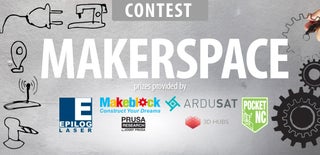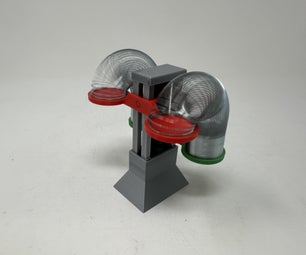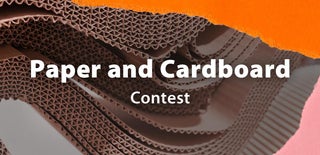Introduction: How to Install and Use the Rotary Jig in the Epilog Fusion
A laser cutter will let you cut or engrave a lot of different materials ranging from soft materials such as cardboard or rubber to hard surfaces such as aluminium and glass. Flat materials are mostly used on a laser cutter, however, some models will let you engrave on cylindrical surfaces using a rotary jig.
This Instructable will show you how to install and use the rotary attachment on the Epilog Fusion laser cutter in order to engrave text and images on your favorite bowl, water bottle or mug.
The Epilog Fusion laser cutter is one of the many tools available to members at YuKonstruct, the first makerspace in Canada's north. Our mission is to provide access to shared space, quality tools, available expertise, and a collaborative environment to help makers build anything!
Step 1: Remove the Vector Grid
The first thing you will need to do is to open the lid of the laser cutter and pull the front panel towards you. This will give you more room to access the vector grid.
Make sure the laser head is in the home position (top left corner). If not, press the reset button.
You can now place your hands on both sides of the grid and lift it. It should come off the bed pretty easily.
You will now have to lower the bed (using the joystick on the panel) to the very bottom of the laser cutter because the electrical plug for the rotary attachment is located fairly low.
Step 2: Installing the Rotary Attachment
IMPORTANT: Turn the power off before plugging the rotary attachment in. If you don't, you can fry the whole laser cutter. And I'm not kidding, it says so on the plug itself.
Now that you have unplugged the engraver, you can place the rotary jig on the metal bed.
Attach the electrical plug to the engraver (far bottom right).
You can now power the laser cutter back on. It will detect the new attachment and position the bed automatically.
Step 3: Adjust the Jig
In order to use the rotary attachment properly, it needs to be calibrated to the object you're engraving.
The jig can be adjusted using 2 mechanisms:
The knob closer to you will lift or lower the orange wheel on the right. Just rotate it to make the top surface of your object horizontal.
The 2 tabs on the scissor jack let you slide left and right. If you want to engrave an aluminium bottle, you might want to move the jack to the right. If you're engraving a cup (shorter), move it to the left.
Step 4: Prepare the Object to Be Engraved
Most of the time, it is a good idea to apply painters' tape to the surface you're engraving. It will either prevent the wood from looking smoky or the glass from chipping.
If your object is hollow such as a cup or a glass, you can use the clamp to keep the material in contact with the rubber wheels. Position your object so that the center of your engraving is facing up.
Another thing to check is that the top edge of the object is horizontal because the laser head won't go up and down. If the top surface is at an angle, the laser won't be focused all the way and the engraving will appear to be blurry.
Step 5: Focus the Laser Head
Because you can't select your material thickness like you usually do with the vector grid, you will have to adjust the laser head manually. To do that, we will use the focus gauge (little triangle).
Select the "Focus" menu on the panel control. It will disable the X motor so you can move the laser head left and right. Using the joystick, jog up and down until the gauge comes in contact with your object. When you're done, press reset and remove the gauge.
You're all set to start the job.
Step 6: Engrave!
Remember to rotate your design 90 degrees counter clockwise and un-check the "Auto Focus" option on the print dialog before you send the job to the laser cutter.
Press Go to start the job. It will rotate your object a bit and start engraving.
Step 7: Remove the Rotary Jig
In order to remove the jig, you will need to lower the bed, turn the engraver off, unplug and remove the jig, put the vector grid back and turn the laser cutter back on.

Participated in the
Makerspace Contest













